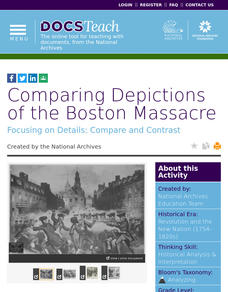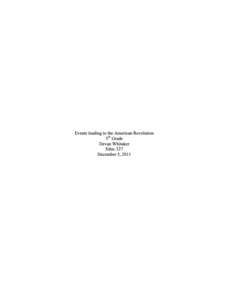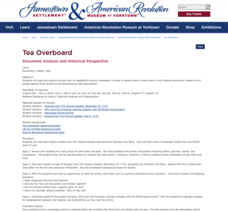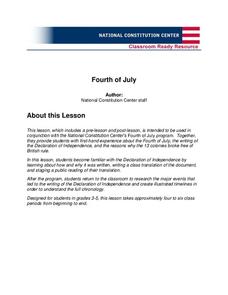Carolina K-12
Causes of the American Revolution
Beginning with the experience of hearing that lockers in school will be taxed, through analysis of political cartoons and informational text, and culminating in a debate between loyalists and patriots, your class members will engage in a...
Los Angeles Unified School District
Why Is the Declaration of Independence Important?
Fair or unfair? To begin a study of the American Revolution, class members review the treatment of the people of the American Colonies by the King of England and decide which were fair and which were unfair. Class members then annotate a...
Curated OER
Past Imperfect: Examining Secondary Sources of the American Revolution
Ninth graders respond in essay form to the following writing prompt. Mel Gibson, star of The Patriot, is quoted as stating, "If one were to adhere to historical accuracy all the way, you'd probably have the most boring two hours on...
Carolina K-12
The Revolutionary Times
Be sure to grab a copy of the Revolutionary Times! Scholars take a step back in time to report on topics set in the revolutionary period. Events include the ride of Paul Revere, the Battle of Saratoga, and more.
Carolina K-12
Loyalists and Patriots
Your young historians will square off as Loyalists dedicated to the English crown or revolutionaries fighting for a new nation in a role-play of a colonial town hall debate before the American Revolution.
DocsTeach
Memorials, Statues, and Monuments to George Washington
An activity uses images of George Washington's statues to compare how they represent different aspects of his life. Scholars complete a worksheet based on their findings and then share as a group how they would construct a new memorial...
Center for History Education
How Did the Public View Women’s Contributions to the Revolutionary War Effort?
Calling upon the legacies of Joan of Arc, Elizabeth I, and Catherine the Great, Esther Reed rallied Southern women to support the American Revolution. Using a broadside by Reed and other primary sources, such as poetry, young historians...
Roy Rosenzweig Center for History and New Media
The Revolutionary Times as Seen Through the Eyes of Women
The role of women before and during the American Revolution changed dramatically. To gain an understanding of these changes, middle schoolers analyze primary source documents, including letters from women that supported the patriot cause...
DocsTeach
Comparing Depictions of the Boston Massacre
Academics compare images of the Boston Massacre to understand differing opinions of the event. Scholars view multiple images, participate in group discussion, and complete a series of written prompts. Young historians gain an...
DocsTeach
To Sign or Not to Sign
To sign or not to sign, that is the question. Scholars review the Declaration of Independence and discuss the Framers' decisions for signing the document. The activity uses primary text, a worksheet, and group discussion to help...
DocsTeach
Road to Revolution: Patriotism or Treason?
Patriot or traitor? Scholars debate the line between patriotism and treason in a short activity. Academics analyze a political cartoon and discuss varying viewpoints between different groups living in the American colonies. The activity...
Pace University
American Revolution
Young historians get hooked into a unit study of the American Revolution with a simulation that lets them experience some of the outrage colonists felt about unfair taxes. Class members demonstrate what they have learned in the study by...
Manchester University
Events leading to the American Revolution
The Stamp Act, Paul Revere's ride, and the Boston Tea Party pushed American colonists to the tipping point that led to the American Revolution. Fifth graders research the key figures of the war, study the Declaration of Independence, and...
Jamestown-Yorktown Foundation
Why Did Some Colonial Virginians Seek Independence?
To understand the reasonings of those colonials who sought independence from England, young historians are divided into content groups that examine documents related to either the Boston Tea Party, the Yorktown Tea Party, Tea Overboard,...
Jamestown-Yorktown Foundation
Tea Overboard
While less well known than the event in Boston, the Yorktown Tea Party was equally decisive in turning community sentiment against Great Britain. To gain an understanding of why the colonists objected to the Tea Act, young historians...
Jamestown-Yorktown Foundation
Life of a Private Lesson Plan
In order to understand the challenges the Continental Army faced during the American Revolution, class members analyze primary source materials including a soldier's journal and an officer's letter, and watch a short reenactment video.
Jamestown-Yorktown Foundation
Making a Patriot Inquiry: Are Independence, Freedom, and Liberty the Same Thing?
As part of a study of the American Revolution, class members engage in an inquiry-based lesson that has them watch a scene from the play Slave Spy, examine multiple primary source documents, and then discuss the similarities and...
North Carolina Consortium for Middle East Studies
Missing Pieces of the Puzzle: African Americans in Revolutionary Times
What's missing from most studies of the American Revolutionary War is information about the role African Americans played in the conflict. To correct this oversight, middle schoolers research groups like the Black Loyalists and Black...
Reading Through History
Patriots and Loyalists
Patriots versus Loyalists, a huge divide during the Revolutionary War in what would become the United States of America. An informative resource includes both direct instruction about the two groups and a quiz pupils take after reading...
National Constitution Center
Fourth of July (Grades 3-5)
Bring history to life for your young scholars with a Fourth of July lesson series. After a class reading of the Declaration of Independence, students translate this pivotal document into layman's terms before working in small groups to...
National Endowment for the Humanities
Background on the Patriot Attitude toward the Monarch
Learners explain the Patriot attitude toward the British monarchy, which helps them embrace the Founders' reluctance to have a strong executive under the Articles of Confederation as well as their desire to build in checks of executive...
Curated OER
Revolution! Freedom for All?
Twelfth graders examine the causes of freedom by revolutionary patriots. In this Civics and Economics lesson, 12th graders analyze primary sources. Students work cooperatively to write a freedom declaration for their group.
Curated OER
To Declare Independence or Not??
Students debate and role play about whether the colonists should declare independence from England or not. In this American history and oral communication lesson, students read informational text about the colonists and their...
Curated OER
American Revolution Biographical Trading Cards
Young scholars create trading cards based on Patriots and Loyalists that were influential in the American Revolution. In this American Revolution lesson plan, students make and trade their cards, keeping one of their own for themselves.

























